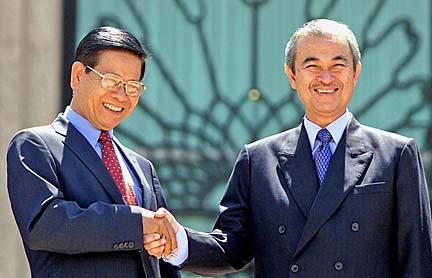
ASIAN OUTLOOK
Malaysian Prime Minister Abdullah Ahmad Badawi, right, shook hands last Tuesday with his Myanmar counterpart, Khin Nyunt, at Badawi's office in Putrajaya.
Badawi: Is he a kinder,
gentler Mahathir?
Kuala Lumpur >> Malaysian Prime Minister Abdullah Badawi is proving to be a kinder, gentler, but no less candid, thoughtful and thought-provoking version of his mercurial predecessor.
The soft-spoken, devout Muslim leader has surprised critics and supporters alike by taking an exceptionally firm stand against corruption and extremism since replacing Mahathir Mohammed last October.
He also has delivered the type of pointed criticisms of both the west and the Islamic world for which his predecessor was noted, but without the deliberately racist, anti-Semitic invectives that served to largely overshadow Mahathir's otherwise important message.
Speaking before an international audience last Tuesday in Kuala Lumpur, Badawi observed that many Muslims were "in denial," refusing to acknowledge that "Islamic teachings have been corrupted by some groups to serve their militant cause. ... Nothing can make a virtue out of the massacre of innocent men, women and children."
Undemocratic government, oppression, poverty and poor governance all contribute to terrorism and must be addressed, he said. Most significantly, he acknowledged the need to "confront the militant teachings in the peripheries and discredit them," noting the need to "radically alter the curriculum of religious schools" in some countries.
The broader international community and especially the United States also were in denial, Badawi asserted, pointing to both the Israeli-Palestinian conflict and the situation in Iraq as prominent among the root causes of terrorism that are not being sufficiently addressed. While critical of past actions, he noted that the latest plan for Iraq offered "some hope for progress."
For it to work, however, certain criteria must be met: The Iraqi people must exercise "full" sovereignty; foreign forces on Iraqi soil must be part of a U.N.-mandated multinational force; Iraq must develop the capacity to provide for its own security; and the interim government must be seen as credible and independent. Washington shares these goals in principle; the challenge will be to convince the international community that it accepts them in practice as well.
More often than not, Badawi's criticisms of the United States were indirect, but no less pointed. When he observed that "we are not only refusing to recognize some root causes, we are consciously and deliberately aggravating them," it was pretty clear which "we" he had in mind. One also can accuse the prime minister of being somewhat disingenuous when he observed that the Geneva Conventions had been "brutalized" and that "such inhuman actions will not be easily forgotten or lightly forgiven." True, but the U.S. exposed, condemned and is investigating the abuses at Abu Ghraib prison -- abuses that seem not unlike those now allegedly occurring in Malaysian detention centers.
In another example that it was no longer "business as usual" in Kuala Lumpur, the Malaysian New Straits Times offered a second headline of interest that day: "PM raises Suu Kyi issue with (Myanmar Prime Minister) Khin," pointing out that Malaysia could not ignore actions taken by a neighbor that were "a matter of interest to the international community."
The Malaysian prime minister reportedly informed his Myanmar counterpart that "it was important that Malaysia and other ASEAN (Association of Southeast Asian Nations) members be informed about the status of (Nobel laureate Aung San Suu Kyi's) house arrest and why her party, the National League for Democracy, was not participating in the country's national convention to draft its constitution."
There is a growing recognition in Malaysia, and throughout ASEAN, that actions in one country affect the interests of the others and thus cannot be ignored, non-interference principles notwithstanding. This is especially critical in the case of Myanmar, since Rangoon is expected to assume the rotating ASEAN chair in 2006, setting the stage for a showdown with ASEAN's regional dialogue partners (including the United States) if progress has not been achieved in pursing Khin's "roadmap to democracy."
This can occur only through continued "constructive engagement" on the part of Myanmar's ASEAN colleagues, and especially from Badawi, given Malaysia's lead role in integrating the black sheep of ASEAN into the flock. Let's hope his actions are as firm and direct as his words.
Ralph A. Cossa is president of the Pacific Forum CSIS, a Honolulu-based nonprofit research institute, and senior editor of Comparative Connections.
— ADVERTISEMENTS —
— ADVERTISEMENTS —
